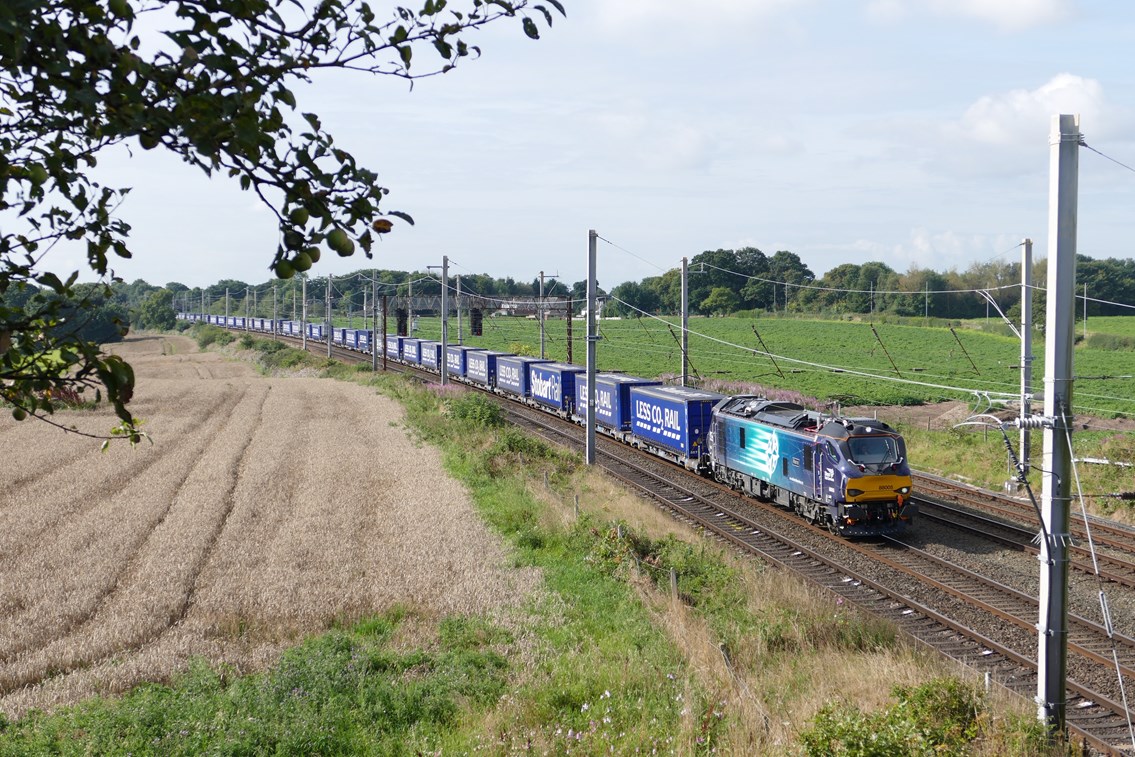Monday 20 Apr 2020
Key freight routes in focus on Scotland’s Railway
- Region & Route:
- Scotland’s Railway: Scotland
Every day during the coronavirus crisis, more than 14,000 tonnes of products - including food and medicine - are being moved across Scotland’s rail network.
That’s 100,000 tonnes of goods each week that will help ensure that families in every part of our country - from Inverness to Dumfries, in rural communities and in towns and cities across the central belt, continue to see supermarket shelves filled.
Rail freight in normal times goes largely unnoticed – travelling by night and rumbling thought the darkness. But these are not normal times and Scotland’s freight routes are in the spotlight.
As Scotland does not have any deep-sea ports, it relies on cross-border freight services to keep its shops, pharmacies, and hospitals stocked and warehouses supplied for online shopping.
More than seven thousand tonnes of products - including beans, bananas, pasta and other essentials, pass over the England-Scotland border every 24 hours - meaning that goods can be stacked on supermarket shelves the next day.
With Britain in crisis, locked down to halt the spread of coronavirus, the importance of freight comes into sharp focus. Customer demand for critical supplies to supermarkets has remained consistent, and the freight industry is standing together with Network Rail to keep key supply lines open and trains moving.
As the coronavirus pandemic goes on, Network Rail’s priority is to keep vital supply routes, notably both the East and West Coast main lines, open. Critical to this are front-line specialists, such as signallers and maintenance teams, without whom the railway cannot operate.
Liam Sumpter, route director for Network Rail Scotland, said: “While the country pulls together to reduce the spread of Coronavirus, our front-line ‘key workers’ – including signallers, control room and track engineers, are working tirelessly to keep the railway running so that critical goods like food, fuel and medical supplies can continue to move across the country. It also means essential workers like carers, nurses and doctors can get to and from work.
“Running a safe and reliable railway is more important now than ever before. I’m proud of my team and the part they’re playing in keeping the country moving.”
Freight companies are looking at how they can run longer trains in order to get more containers per train to meet a forecast rise in demand over coming weeks and months.
Maggie Simpson, director general of Rail Freight Group, said: “The rail freight industry is working flat out to make sure essential supplies are available on supermarket shelves, that the lights stay on and that the warehouses have all the goods we need for online shopping.
“It is a real testament to all our staff, and those at Network Rail and across the railway for keeping up with changing demand and helping the whole of the UK in these difficult times.”
To prioritise freight and key worker journeys, a reduced timetable is currently running on the railway network.
Government guidelines are advising the public to only travel if absolutely essential.
People making essential journeys should visit www.nationalrail.co.uk to check the revised train times.
Notes to Editors
Freight Movements
In a typical week, 147 freight trains into/out of and across Scotland moved 100,000 tonnes of products bound for supermarkets and warehouses.
59 freight trains ran cross-border into Scotland carrying 50,000 tonnes of essential goods to fill shelves
- Scotland’s supermarkets rely on goods by rail from Daventry, Tees Port, Felixstowe, London Gateway and Liverpool
- Royal Mail post goes by rail between London and Glasgow
Contact information
Passengers / community members
Network Rail national helpline
03457 11 41 41
Latest travel advice
Please visit National Rail Enquiries
Journalists
Network Rail press office - Owen Campbell
NR Press Office 0141 555 4108 / 07515 617073
Owen.Campbell1@networkrail.co.uk
About Network Rail
We own, operate and develop Britain's railway infrastructure; that's 20,000 miles of track, 30,000 bridges, tunnels and viaducts and the thousands of signals, level crossings and stations. We run 20 of the UK's largest stations while all the others, over 2,500, are run by the country's train operating companies.
Usually, there are almost five million journeys made in the UK and over 600 freight trains run on the network. People depend on Britain's railway for their daily commute, to visit friends and loved ones and to get them home safe every day. Our role is to deliver a safe and reliable railway, so we carefully manage and deliver thousands of projects every year that form part of the multi-billion pound Railway Upgrade Plan, to grow and expand the nation's railway network to respond to the tremendous growth and demand the railway has experienced - a doubling of passenger journeys over the past 20 years.
Follow us on Twitter: @networkrail
Visit our online newsroom: www.networkrailmediacentre.co.uk

